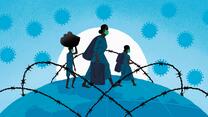With displacement soaring to a record 82.4 million in 2020, refugees and displaced people have been particularly impacted by the pandemic. These groups have faced significant new challenges. An ‘infodemic’, or an overabundance of information –some accurate, some not –has spread rapidly alongside COVID-19, allowing misinformation narratives to flourish. Myths surrounding COVID-19 often undermine public health advice, and where communities experience linguistic, cultural, and practical barriers to accessing healthcare services their impact can be particularly pronounced. Meanwhile, pre-existing barriers to seeking safety and international protection, securing decent work, and integrating into local communities have been exacerbated.
This report from the International Rescue Committee explores how the COVID-19 response effort has addressed these challenges, with implications for the resettlement and integration of refugees in Europe. The report calls for urgent action from the European Commission and member states to support and capitalise on innovations in resettlement programming, counter misinformation and promote equitable access to healthcare, and facilitate substantive opportunities for refugee participation in decision making. In doing so, policy makers have the opportunity not only to effectively respond to the challenges posed by COVID-19 but to chart a more inclusive way forward beyond the upheaval of the pandemic. A Europe that prioritises protection, tackles misinformation in refugee and migrant communities, and works in partnership with these groups, will succeed in fostering more inclusive and welcoming societies.



